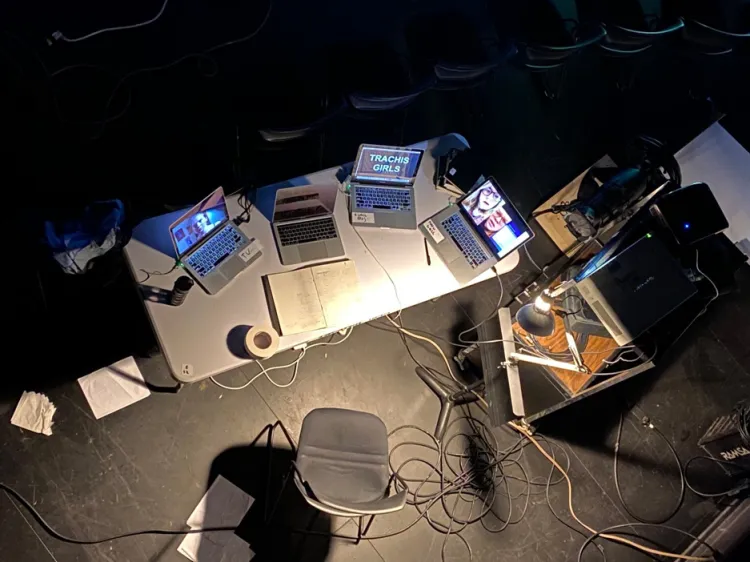THE WOMEN OF TRACHIS
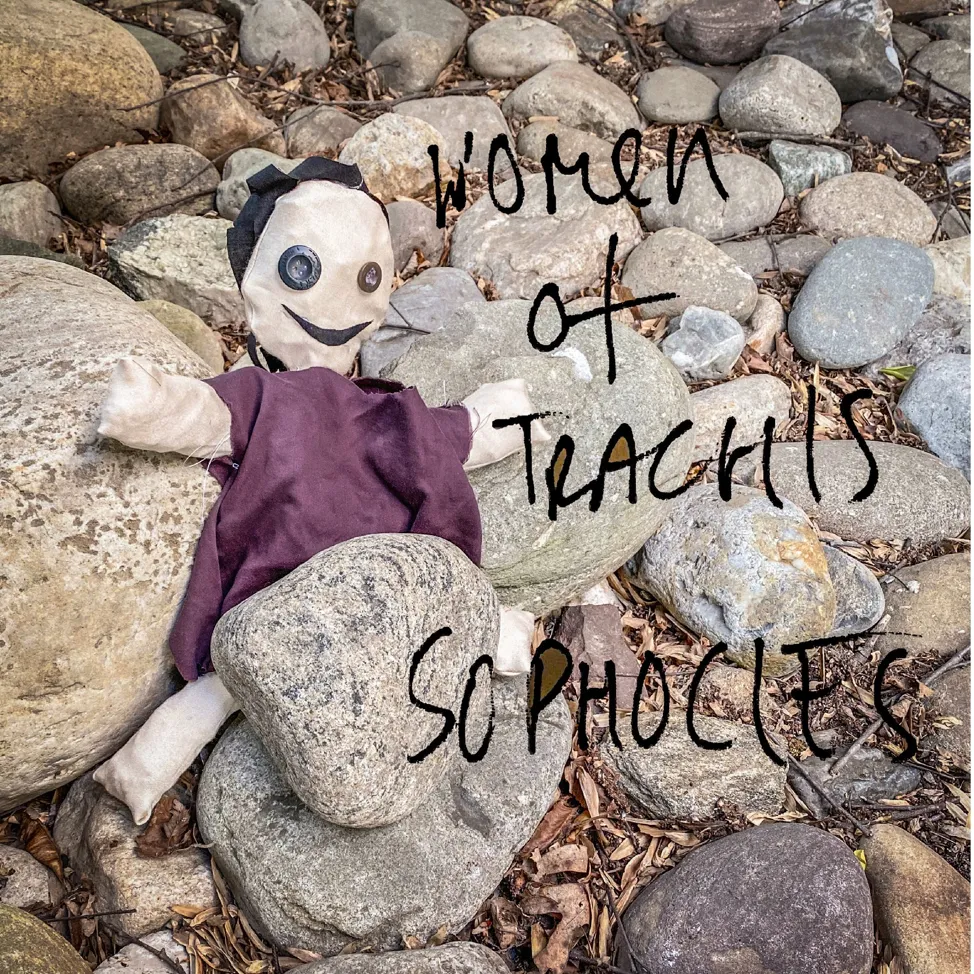
PRESS
THE WASHINGTON POST
THE BROAD STREET REVIEW
DIDASKALIA (Poland) [pdf, translation] | DIDASKALIA (in Polish)
THE PHOENIX
THAT WHICH WILL REMAIN UNSEEN
SWARTHMORE COLLEGE DEPARTMENT OF THEATER PRESENTS:
SOPHOCLES
THE WOMEN OF TRACHIS
Directed by Michał Zadara
with Alex Kingsley, Nadia Malaya, Josephine Ross, and Cynthia Ruimin Shi Dramaturg: Ziv Stern
PROGRAM BOOK
In the middle of the pandemic, Swarthmore visiting faculty director, Michał Zadara, stages Sophocles’ The Women of Trachis. Sophocles has his chorus of young women witness a non-public aspect of Heracles: his brutality toward women, animals, and societies. Today, theatres are closed and Sophocles’ truth must remain hidden. Zadara and his students have developed a version of Sophocles’ tragedy that consists of objects and multimedia controlled by a computer. The theater will be empty, there will be no live performers. No audience will discover what these women of Trachis saw. This knowledge will remain unheard and unseen.
OPENS Friday, April 24, 2020, 8 pm, Frear Ensemble Theater, Swarthmore College
NO ONE WILL BE ADMITTED - NO ONE WILL BE ON STAGE
DON’T CALL FOR RESERVATIONS
NO LIVE STREAMING
About 32 min, no intermission.
Co-sponsored by the Department of Classics and the Swarthmore College Honors Program.
For press inquiries, contact: Allen Kuharski - akuhars1@swarthmore.edu Michał Zadara - mzadara1@swarthmore.edu
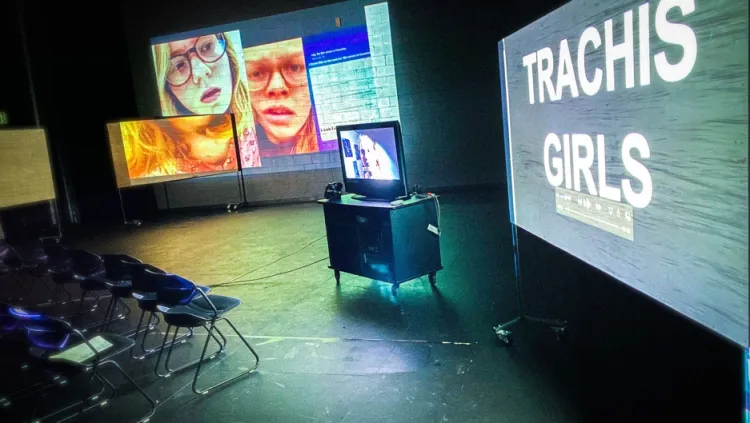
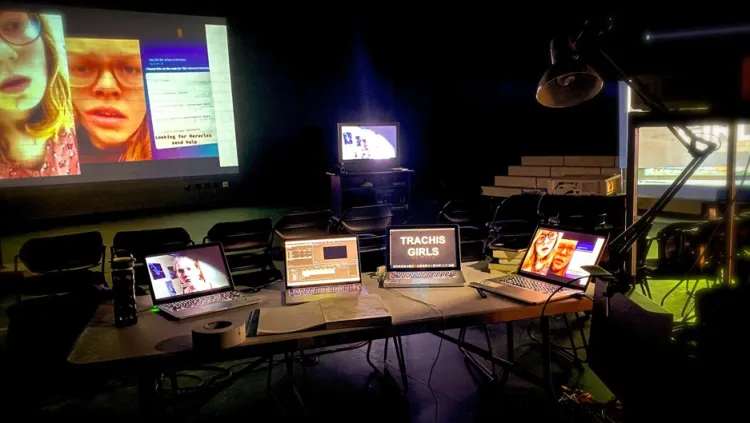
Women of Trachis - rehearsal without performers
SOPHOCLES’ WOMEN OF TRACHIS
The Women of Trachis (which can also be translated as Trachis Girls or Teenagers from Trachis) is one of Sophocles’ least performed and most compelling plays. The play explores issues of power, depression, love, and violence. Greece’s most revered hero, Heracles, has destroyed a city and murdered its inhabitants in order to rape its King’s daughter. His wife, Deianeira, tries to win back his love with a potion that ends up killing him. The question is: to what extent was Deianeira’s action an accident, and to what extent did she find life with Heracles unbearable?
The chorus witnesses the inglorious demise of Greece’s most famous hero. They see a side of Heracles that was supposed to remain unseen: a man who causes needless suffering to satisfy his own pleasure and ambition and then is killed by his wife. Thus, the play is ultimately about what the chorus sees: the dark underside of heroic myths, the price of pain felt by those at the receiving end of the heroic story.
The text used in this production is a new translation by the ensemble from Ancient Greek.
THEATRE WITHOUT WITNESSES
What is lost when the theatre is shut down? In the end, tragedy is an encounter with everything that cannot be expressed through just words or images. In the theatre, what is not seen is more important than what is on stage. In this production of Sophocles’ play, nothing will be seen. The crimes and amorality of Heracles will be hidden from view, seen only by the fictional Women of Trachis. M ichał Zadara stages a live performance which no one - not even the performers - will witness.
The performance is a result of Michał Zadara’s Swarthmore College class “Tragedy as Contemporary Theatre.” His students read and analyzed Greek tragedies and then chose The Women of Trachis to stage. Classes on campus were cancelled in March, but Zadara has continued his theatre work with the students online.
Swarthmore’s Lang Performing Arts Center (LPAC) is empty. In isolation, Zadara is connecting equipment, moving scenery, and testing the multimedia his students are sending him. On April 24, 2020, a computer will start all the cues for the light, sound, and video, and the story of how Deianeira killed herself after killing her husband, Heracles, will be told. The cast and crew are recorded and the audience is absent.
Swarthmore College’s renowned Department of Theater continues to make live, collective work under these extreme and unique conditions. This performance will exist — and embody -- absence as the social reality of this time.
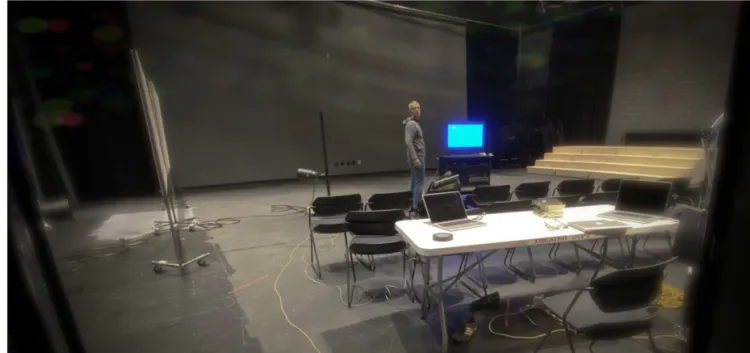
Michał Zadara setting up on stage
MICHAŁ ZADARA
Polish theatre and opera director Michał Zadara has been described by culture.pl as “one of the most talented theatre directors of his generation, best known for his bold theatrical interpretations of the classics of world literature.” One of his greatest achievements was a critically acclaimed and popular 14-hour staging of Adam Mickiewicz's Romantic masterpiece Forefathers’ Eve (Dziady) , the first complete staging of this play in theatre history. Zadara’s original piece Chopin Without Piano was performed in Philadelphia with major funding from the Pew Center for Arts & Heritage, in addition to touring internationally. Chopin Without Piano was recognized by the Boston Globe a s the “best theatre production in Boston in 2015.” Zadara’s Polish production of Witold Gombrowicz’s musical political satire Operetta was presented by Philadelphia Fringe/Arts at the Wilma Theatre in 2009.
A 1999 Honors graduate of Swarthmore College, Zadara has worked at the Komische Oper and Maxim Gorki Theatre in Berlin, the Schauspielhaus in Vienna, the HaBimah National Theatre in Tel Aviv, and at theatres across Poland, including the National Theatre, National Opera, Teatr Polski in Wrocław, Narodowy Stary Teatr in Kraków, Teatr Nowy, Teatr Powszechny, and Teatr Studio in Warsaw. In 2012, together with Barbara Wysocka, Zadara founded CENTRALA: a company that produces art outside of institutional constraints and organizes social interventions. CENTRALA’s first film production, Films From The Smog Years (2019), screens in the official selection of the European Short Film Festival ÉCU in Paris on April 24, 2020.
This academic year, Michał Zadara is Cornell Visiting Professor at Swarthmore College, where he teaches courses on Greek tragedy in both the Theater and Classics departments. Besides teaching and directing work related to Greek tragedy, he is preparing a stage adaptation of Nobel laureate Olga Tokarczuk’s novel Flights, to be performed in Poland in December.
While at Swarthmore in the years 1994-1999, Michał Zadara studied directing and theater history with Allen Kuharski, Stephen Lang Professor of Performing Arts. Kuharski also became a founding member of CENTRALA, where he writes dramaturgical essays for all new productions. He has published extensively about Zadara’s work in both Polish and English. With Zadara, Kuharski is co-teaching the Acting Capstone course that is the vehicle for this production of The Women of Trachis.
THE DOCUMENTARY
The process of making The Women of Trachis is being documented by videographers Gabriel Johnson and Rob Harris, with a generous grant from Swarthmore’s unique Honors Program. This documentary film will be screened next academic year and will provide insight into his production, which will not be open to the public.\

Rehearsal photo: Nadia Malaya, Cynthia Ruimin Shi, Sophie Nasrallah, Alex Kingsley, Josephine Ross.

Alex Kingsley, Nadia Malaya, and Josephine Ross as the chorus.
